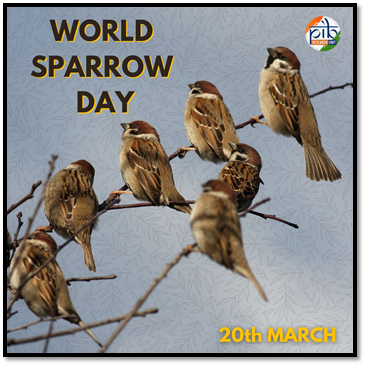World Sparrow Day, celebrated annually on March 20, aims to raise awareness about the alarming decline in sparrow populations due to urbanization, pollution, and habitat loss.
The day also promotes crucial conservation efforts to protect these small but vital birds, which play a key role in maintaining ecological balance.
Launched in 2010 by the bird conservation group “Nature Forever,” World Sparrow Day now spans over 50 countries, highlighting the urgent need to reverse the decline of sparrows. These birds are essential to ecosystems, controlling insect populations, aiding in pollination, and dispersing seeds—functions vital to both rural and urban environments.
According to a 2018 report by the Royal Society of London, the relationship between humans and sparrows dates back 11,000 years, illustrating their long-standing presence in our shared history.
In India, sparrows, known by various names such as “Goraiya” (Hindi), “Kuruvi” (Tamil), and “Chirya” (Urdu), are facing a sharp population decline.
Several factors, including the use of unleaded petrol that produces toxic compounds harmful to insects sparrows feed on, as well as pesticide use that reduces insect populations, have impacted their food supply. Additionally, rapid urbanization has led to the loss of nesting spaces in modern buildings, further shrinking their habitat.
The Ministry of Environment, Forest, and Climate Change issued a statement underscoring the importance of World Sparrow Day, emphasizing that small actions—such as planting greenery, reducing pesticide use, and creating safe nesting spaces—can collectively support sparrow conservation.
Grassroots initiatives across India are already making strides. In Chennai, the Koodugal Trust has involved schoolchildren in building sparrow nests, resulting in over 10,000 nests between 2020 and 2024, significantly boosting local sparrow numbers.
In Mysuru, the “Early Bird” campaign educates children on the importance of sparrows through birdwatching trips, libraries, and village visits, fostering appreciation for these birds.
In 2012, the Delhi government declared the house sparrow as the state bird, marking its symbolic importance in the capital.
Several individuals are also contributing to sparrow conservation. The “Save the Sparrow” campaign, led by environmental conservationist Jagat Kinkhabwala, gained significant momentum after Prime Minister Narendra Modi supported it in 2017.
Rajya Sabha MP Brij Lal has built 50 nests at his home, where sparrows now return to lay eggs—a commitment praised by PM Modi as an exemplary initiative in the fight to protect sparrows.




















